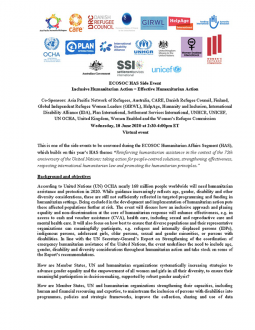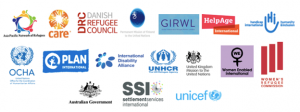
Event: “Inclusive Humanitarian Action = Effective Humanitarian Action” at 2020 Economic and Social Council Humanitarian Affairs Segment

Economic and Social Council (ECOSOC) Humanitarian Affairs Segment (HAS) Side Event
“Inclusive Humanitarian Action = Effective Humanitarian Action”
Co-Sponsors: Asia Pacific Network of Refugees, Australia, CARE, Danish Refugee Council, Finland, Global Independent Refugee Women Leaders (GIRWL), HelpAge, Humanity and Inclusion, International Disability Alliance (IDA), Plan International, Settlement Services International, UNHCR, UNICEF, UN OCHA, United Kingdom, Women Enabled, and the Women’s Refugee Commission
Wednesday, June 10, 2020, 2:30-4 p.m. ET
Virtual event
This is one of the side events to be convened during the ECOSOC Humanitarian Affairs Segment (HAS), which builds on this year’s HAS theme: “Reinforcing humanitarian assistance in the context of the 75th anniversary of the United Nations: taking action for people-centered solutions, strengthening effectiveness, respecting international humanitarian law and promoting the humanitarian principles.”
Background and objectives
According to United Nations (UN) OCHA nearly 168 million people worldwide will need humanitarian assistance and protection in 2020. While guidance increasingly reflects age, gender, disability and other diversity considerations, these are still not sufficiently reflected in targeted programming and funding in humanitarian settings. Being excluded in the development and implementation of humanitarian action puts these affected populations further at risk. The event will discuss how an inclusive approach and placing equality and non-discrimination at the core of humanitarian response will enhance effectiveness, e.g. in access to cash and voucher assistance (CVA), health care, including sexual and reproductive care and mental health care. It will also focus on how best to ensure that diverse populations and their representative organizations can meaningfully participate, e.g. refugees and internally displaced persons (IDPs), indigenous persons, adolescent girls, older persons, sexual and gender minorities, or persons with disabilities. In line with the UN Secretary-General’s Report on Strengthening of the coordination of emergency humanitarian assistance of the United Nations, the event underlines the need to include age, gender, disability and diversity considerations throughout humanitarian action and take stock on some of the Report’s recommendations.
How are Member States, UN and humanitarian organizations systematically increasing strategies to advance gender equality and the empowerment of all women and girls in all their diversity, to ensure their meaningful participation in decision-making, supported by robust gender analysis?
How are Member States, UN and humanitarian organizations strengthening their capacities, including human and financial resourcing and expertise, to mainstream the inclusion of persons with disabilities into programmes, policies and strategic frameworks, improve the collection, sharing and use of data disaggregated by disability and ensure the participation of persons with disabilities at all stages of the humanitarian programme cycle?
How are Member States, the UN and humanitarian organizations ensuring responses are age-sensitive, e.g. ensuring the protection and meaningful participation of adolescent girls and older persons in humanitarian response?
How has the COVID-19 crisis exposed or brought to the fore on inclusion, for example, many actors on various levels did not include older people, despite them facing the primary impact?
Discussion point
Participants will discuss how to accelerate progress for inclusive humanitarian action and ensure meaningful participation by using an intersectional approach. The event will discuss best ways on how to support those most affected and their representative organizations, acknowledging that diverse factors can shape an individual’s experience and contribute to multiple forms of discrimination.
Key concrete action points and recommendations/take away messages
- Taking an age, gender, disability and diversity inclusive approach throughout humanitarian action and the meaningful participation of affected populations and their representative organizations is key to enhancing effectiveness.
- No protection without participation: Lessons learned on the advancement of gender equality in humanitarian action that can be applied to the inclusion of age, disability and other diversity considerations.
- Steps on ensuring that progress in inclusive humanitarian action, including on funding, are not set back in light of resources being increasingly dedicated to responding to the COVID-19 crisis.
Format
The 90-minute moderated dialogue will feature 3-5 min interventions by select panelists on current and future challenges and recommendations. After the panel, the moderator will open the floor for questions to panelists from audience members via video and chat box.
Chair and moderator
Charlotte V. McClain-Nhlapo, Global Disability Advisor, World Bank Group
Opening Remarks
Opening Remarks by H.E. Ambassador Mitch Fifield, Permanent Representative of Australia to the UN
Panel composition
- Mia Farah, Self-Advocate Lebanon
- Foni Joyce Vuni, Global Youth Advisory Council (GYAC)
- Rahma Mustafa, Sudan National Union of Persons with Physical Disability
- Kizito Chiwala, Country Director, HelpAge-Mozambique
Concluding remarks from Finland
Background Material
- IASC Guidelines on Inclusion of Persons with Disabilities in Humanitarian Action
- IASC Gender Handbook for Humanitarian Action
- IASC Gender Alert for COVID-19 Outbreak
- IASC COVID-19 Resources page on Accountability and Inclusion
- Core Commitments for Children in Humanitarian Action
- Whistler Declaration on Gender Equality and the Empowerment of Women and Girls in Humanitarian Action
- Global Humanitarian Response Plan (GHRP) on COVID-19
- WRC, Plan, CARE and others “Leaving No One Behind: Ensuring an Age, Gender, and Diversity (AGD) Inclusive Approach to Internal Displacement”
- UNICEF, Five actions for gender equality in the coronavirus disease (COVID-19) response
- Report of the UN Special Rapporteur on the human rights of internally displaced persons
Connection details to join the virtual event
Please register here to receive information on call-in details [LINK]: https://forms.gle/NHNUiHg2v43D2b9HA
International Sign will be provided.
Contact
For more information or interest in co-sponsorship, please contact:
Focal Point 1
Ms. Stephanie Johanssen, Women’s Refugee Commission
StephanieJ@wrcommission.org
Focal Point 2
Ms. Lindsey Hutchison, PLAN International
Lindsey.Hutchison@plan-international.org

